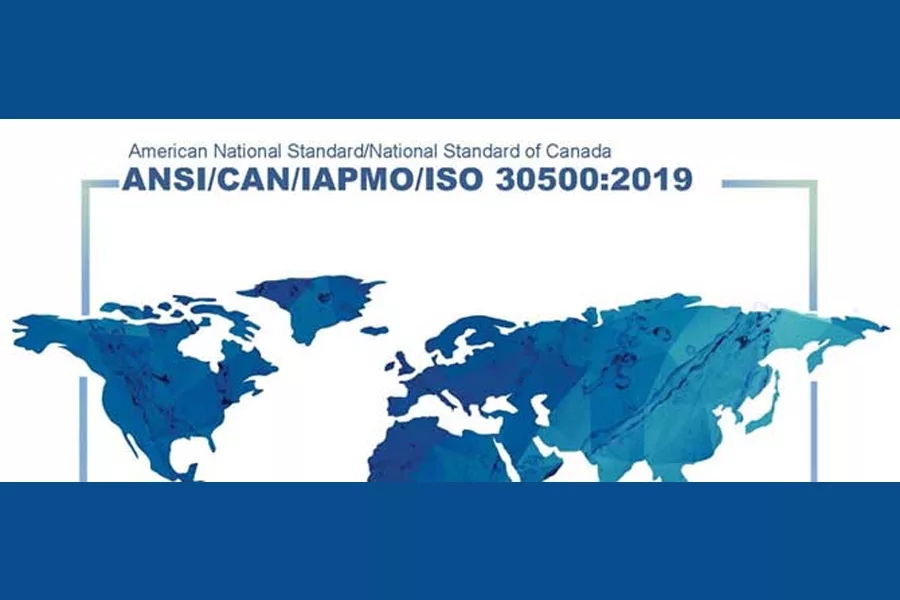The International Association of Plumbing and Mechanical Officials (IAPMO) has published ANSI/CAN/IAPMO/ISO 30500:2019, Non-Sewered Sanitation Systems — Prefabricated Integrated Treatment Units — General Safety and Performance Requirements for Design and Testing as an identical National Adoption Standard for both the United States and Canada. The standard is available for purchase at the IAPMO bookstore in both English and French.
The ANSI/CAN/IAPMO/ISO 30500 standard specifies general safety and performance requirements for design and testing, as well as sustainability considerations, for non-sewered sanitation systems (NSSS). An NSSS, for the purposes of this document, is a prefabricated integrated treatment unit, comprising frontend (toilet facility) and backend (treatment facility) components. It is applicable to sanitation systems that are either manufactured as one package or manufactured as a set of prefabricated elements designed to be assembled in one location, without further fabrication or modification that influences the system function.
“The adoption of ISO 30500 by Canada and the U.S. will set the stage for great alternatives to existing non-sewered sanitation solutions,” said Dr. Doulaye Koné, deputy director water, sanitation and hygiene, Bill & Melinda Gates Foundation. “Mass production of ISO 30500 compliant integrated toilet and treatment systems will result in safe and aspirational affordable systems that will not just benefit the U.S. and Canada, but the entire world, particularly the poor who often have no access to safely managed sanitation.”
This standard originated as an international standard, ISO 30500, and was developed by 32 participating economies and 16 observing members, with ANSI serving as the U.S. TAG Administrator for ISO PC 305. Canada participated in the development of the international standard through the Canadian Mirror Committee.
For the past few years, ISO has worked with partners to develop new sanitation technologies. One of the most promising is a “reinvented toilet” that essentially functions as its own treatment plant. The concept is part of a broader initiative called the “Reinvent the Toilet Challenge,” launched by the Bill & Melinda Gates Foundation, that aims to deliver sustainable sanitation to the 2.3 billion people who lack access to safe sanitation systems. According to a report issued by the World Health Organization and UNICEF, 2.3 billion people worldwide lack access to basic sanitation facilities, and 892 million people defecate in the open. One of the United Nations’ Sustainable Development Goals is to “Ensure availability and sustainable management of water and sanitation for all,” and ISO 30500 was developed with this in mind.
“This newly approved standard will aid manufacturers, regulators, and consumers with the safe use of ‘reinvented toilets,’ ” said Edward Osann, senior policy analyst, Natural Resources Defense Council (NRDC). ”For too many Americans, effective and affordable sanitation remains out of reach. Products meeting this standard will offer the health and safety of a working toilet that the rest of us take for granted. What's more, reinvented toilets do not use water to transport human waste, a feature that has profound and positive implications for water use and infrastructure investment throughout the country. As climate change poses new threats to the reliability of our water systems, flushing toilets with drinking water may eventually be replaced by the more sustainable approach offered by this new technology.”
“The IAPMO/ISO 30500 standard helps develop new toilet technology that will save millions of lives,” said Hugo Aguilar, senior vice-president of IAPMO Codes and Standards. “We feel privileged in bringing this standard to the U.S. and Canada, as the lack of safe sanitation is not only an issue in developing countries; there are areas in the U.S. and Canada that can benefit from the use of this standard. States like Hawaii or other areas where the use of cesspools is of concern, or California where droughts are common, can benefit from this technology; not to mentioned rural areas in the U.S. and Canada that lack safe sanitation.”
Founded in 1926, IAPMO is a worldwide leader in the promotion of heathy and safe plumbing and mechanical systems. IAPMO has developed standards for more than 30 years, with a focus on plumbing products, water efficiency, solar heating systems and components, mechanical products (including heating, ventilation, cooling and refrigeration system products), and products used in the recreational vehicle and manufactured housing industry.
For more information, contact Kyle Thompson at [email protected]




